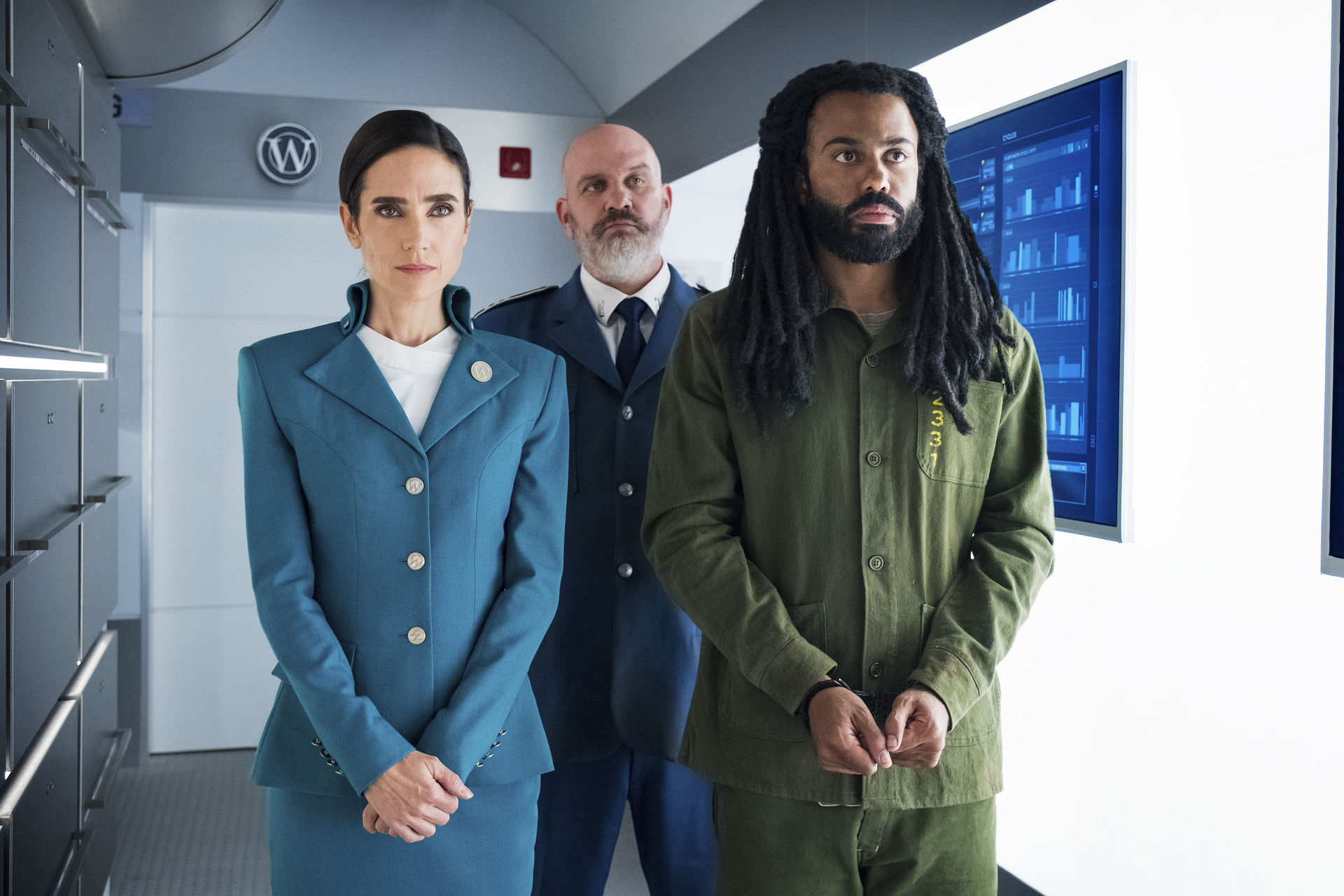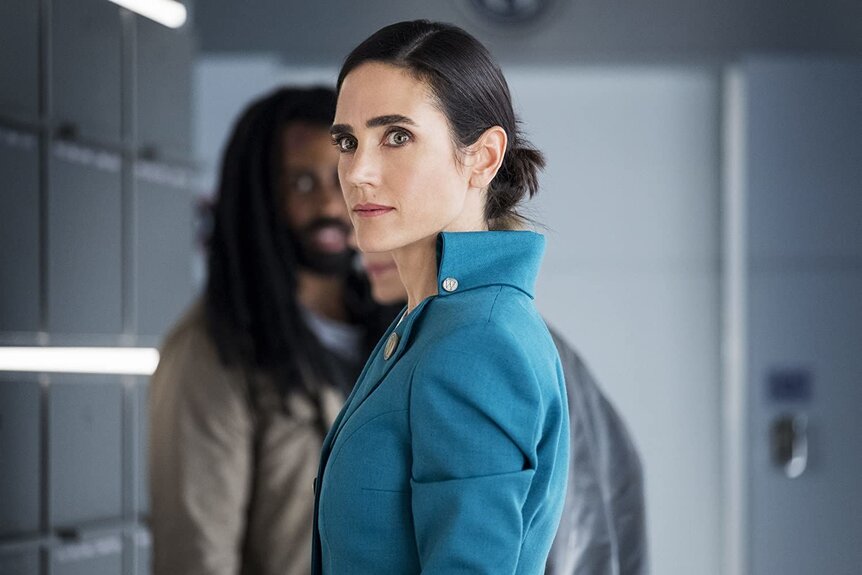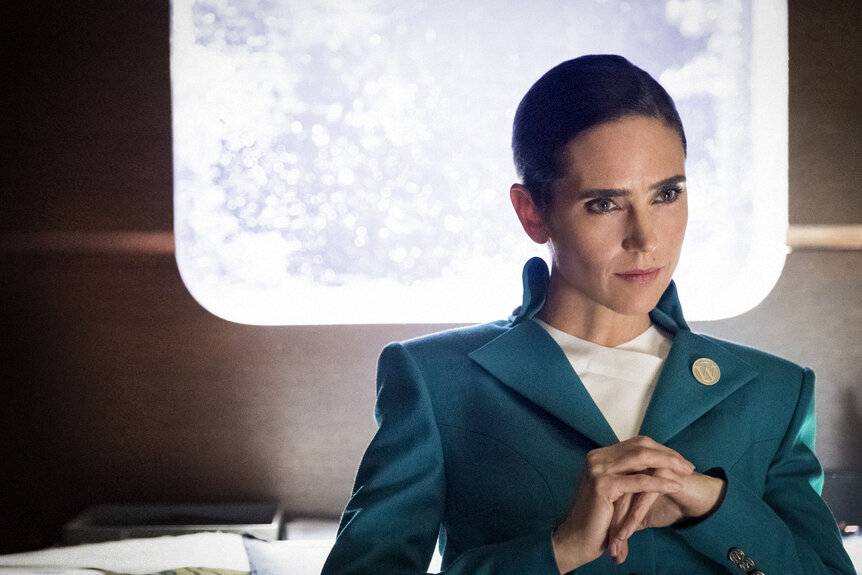Create a free profile to get unlimited access to exclusive videos, sweepstakes, and more!
Snowpiercer was worth the wait to climb aboard, the new show's creators and star say

There was a time when, at least in the public eye, the Snowpiercer TV series seemed ready to derail when it had barely left the station. In January 2018, fresh off a series order, the project went through a showrunner and director change, then was passed from TNT to TBS and back to TNT again before finally landing a premiere date this spring. Now, at last, the tale of a 1,001-car train carrying what's left of humanity through a frozen wasteland is ready to unveil itself to the world.
If you ask executive producer Marty Adelstein, it was worth the wait, not because the delays are finally over and the show can, at last, be seen, but because he felt all along that Snowpiercer was something he had to hold onto.
"In my years of experience doing this, I have found it usually is the case that the most difficult ones to birth are the ones that turn out the best because you have to put so much into it, Adelstein tells SYFY WIRE. "And if you love the material in that, you find it, but it’s not an easy process. And from the minute I saw this — you know, I fell in love with the movie — I wasn’t going to let it go. I mean, we just weren't going to. And I knew we had something special there."
The movie Adelstein is referring to, also called Snowpiercer, is how many fans first discovered this post-apocalyptic tale about a "great ark train" that happens to also be a massive metaphor for the way class inequality works. Director Bong Joon-ho's 2013 film, though, is loosely adapted from the French Le Transperceneige, which also drew Adelstein into this world. Adelstein, whose past TV hits include Prison Break and Hanna, saw the potential for a longer story immediately.
"I was watching the movie with my wife. She asked me afterwards what [I thought] of it, and I just looked at her and said, 'I'm going to make a television show out of it.' Just instantaneously," Adelstein recalls. "I mean, I really love the movie, and I just thought, 'Wow, we could really do a long-running television show with the right characters and stuff.' So, it was really just a gut instinct from the minute I saw it."
Adelstein optioned Snowpiercer through his company, Tomorrow Studios, in 2015, and by the next year, the series was moving forward with Josh Friedman (Terminator: The Sarah Connor Chronicles) as showrunner. Though the concept of the ark train speeding around a frozen Earth and the class metaphors at the heart of the story remained intact, this version of Snowpiercer set out to craft a new cast of characters (with some familiar hallmarks held over from Bong's film) and a new story that would help propel the train and its passengers through a longer narrative.
At the heart of this new, expanded Snowpiercer narrative was a former cop scraping by in the tail of the train named Layton (Daveed Diggs), who gets drafted by Melanie Cavill (Jennifer Connelly), Snowpiercer's enigmatic head of hospitality, to help solve a murder on board. The deeper Layton gets into the mystery, and the further up the train he travels, the more he realizes something much bigger than one killing is going on, even as he's also fighting to free his loved ones suffering in the tail.
After Friedman left the series at the start of 2018, reportedly due to "creative differences," Adelstein needed a new showrunner to carry that mystery cornerstone forward into a new story. He chose Graeme Manson, best known to genre fans for co-creating the acclaimed sci-fi drama Orphan Black. Manson, who Adelstein says was "pretty much who we wanted from the start" of the search, was immediately invested in a way forward for the show, though it meant a significant reworking of the original pilot.
"I sort of had my own take quite quickly on what a Snowpiercer series could look like and what could be its drivers, and the energy and the tone that it could have," Manson tells SYFY WIRE. "But it was quite a process of figuring out how to restart it. For the pilot, at least, there were some very strong things set in stone — largely Jennifer’s and Daveed’s stations on the train — [but they were] not the characters as they played out in my version. Their stations, and what those relationships reveal in the first episode are sort of, plot-wise, similar.
"But I had a very different vision of what the train would feel like, so we were generously given the trust to rebuild all the sets, which we did," Manson continues. "And, once I sorted out what the world might look like and how it might unfold for this group of characters, I met and talked with about half the cast to convince them to take on other roles, new roles, that weren't in the pilot, or the original pilot."
For Connelly, whose character remained at the center of the series even as the scripts began to change, Manson's deft narrative hand was both reassuring and exciting.
"From my perspective, we shot a pilot and then I left, and then there was a lot of upheaval and many changes in the time when the cast members all went away. And then we went back, and then it was this iteration. So, once we started with this version of the show, the one that you see, it was actually, from my perspective, quite a smooth production," she tells SYFY WIRE.
"And it was very much reimagined, this version from the previous iteration, but with the same inspiration," Connelly explains. "I think one thing Graeme did really well was... I thought he was great with plot and great at keeping multiple plots going at the same time and kind of weaving these threads of the different narratives of the different characters because there are a bunch of characters. They're interesting characters, and I think he does a really good job of kind of maintaining all those storylines simultaneously."
Manson's vision for the show retained the murder mystery element that serves as a catalyst within Snowpiercer's pilot, but for him, that was only the beginning of a propulsive journey, a story of "resistance and revolution" that felt true not just to Bong's films, but to the original graphic novel. That meant taking the show to some very dark places — yes, those brutal punishments you remember from the film get their own version in the series — while also striking a balance through often-wicked humor and plenty of sci-fi intrigue that would keep viewers coming back.
"I love that balance. I love a mashup of tones, and it’s something that we did a lot in Orphan Black, managing to have edgier, thrilling stuff as well as dark humor and characters that are distinctly funny in different ways to the audience," Manson says. "It’s just something I particularly like in terms of tone, is that mashup. But the major thing about the storytelling of Orphan Black is that it’s a politically charged action-adventure, and we really tried to not lose sight of that as the main sort of driver of why you want to come down and sit down and watch each week."
Connelly adds: "I thought that was kind of the whole point of the show, that you are able to talk about these things that are resonant with us, that do have a deeper meaning, but it’s done in a fun way. Through a sci-fi lens, we’re telling a very human story. And it’s supposed to be fun and entertaining and spectacular and a little bit fantastical, and I loved the humor. I thought it really worked well. And I liked that Melanie was a little bit, you know, she’s not like a prankster or anything, but she has a little bit of a dry sense of humor. I liked that about her as well."
To help drive that sense of tonal balance, Snowpiercer is set not in the immediate aftermath of the climate disaster that led to the train, but seven years down the road, which means a great many of the characters have at least somewhat relaxed into their new lifestyles. Snowpiercer's 1,001 cars — portrayed with spectacular sets that don't feel nearly as claustrophobic as a show staged entirely on a train would have you believe — contain multitudes, and for Manson, figuring out how to incorporate a certain level of worldbuilding while never losing sight of the plot was a key component of the series.
"Those are like fun questions that you get to spin on in the writers’ room," Manson says. "You come up with a world that gets very particular. You find these particular rules that just work, but make it unique. The rule of Snowpiercer is everybody got on this train in a rush with what they could carry. It’s very interesting to go, 'So, what would you bring on the train? What would your last things be?' And then when you think about the society of the train, it was endlessly fun to say, 'It’s seven years later. What are people still holding on to?'
He continues: "And then, very importantly, how does that reflect our world? And it was really interesting in Snowpiercer for us to say, 'We are seven years from departure, and we departed on the day that the series premiered.' So, the world we left behind is this world, this exact world right now, minus COVID. So, the political issues of the class struggle, of migration and aspiration and detention and this overarching guilt of climate change is the backdrop and the fabric, and it makes it feel relevant and it makes it feel like these are not characters from the future. These are refugees from our world."
Within that "seven years later" framework, Manson and his cast have the opportunity to explore not just who these people have become, but the versions of themselves they left behind. Layton is a former homicide detective, and as he journeys through the train, he finds his old self coming back to both haunt and drive him in more ways than one. He also finds that just about everyone else on the train is harboring similar shadows of their former selves, including Melanie. For Connelly, that meant finding some very specific ways to indicate her character's inner and outer life.
"She is sort of in charge of hospitality, so she is responsible for smooth relations," Connelly says. "So, she has to convey certain things, so I thought about how she might feel that she would do that effectively, and how she would talk and how she would move and how she would do her hair and stuff. I really like that about the character. I think more and more as you go through the season you start to see different layers of her emerge, which was really fun to play."
As it prepares to launch its post-apocalyptic journey around the globe, Snowpiercer is already looking ahead to what's next. A second season of the series is already in production, during which Adelstein promises "the world will expand" even more despite the confines of the train and its finite number of passengers. Many more adventures at the end of the world lie ahead for this series, and while it's not lost on the cast or creators that the show is arriving at a strange time for humanity, they still see the series as the kind of thought-provoking genre fare worth diving into right now.
"There are enough fantastical elements that I think we can watch it and it can just be a fun viewing experience and you can feel sort of a step removed from it in that way," Connelly says. "But I don't know; me, personally, these are the things that are kind of kicking around in my head, you know? Like, 'How are things going to play out? How are we using our resources?' We have all been separated from our communities, from the lives we’ve lived, from the places that we love out there on the planet, and we’re all living a version of what these characters are going through on the show right now. Personally, I’m interested in those stories. Sometimes I just want to watch The Great British Baking Show, but sometimes I want to watch things that feel like they're speaking to the things that I’m experiencing right now."
Snowpiercer premieres on Sunday, May 17 at 9 p.m. Eastern on TNT. Outside the U.S. and China, the series will debut on Netflix on May 25.




























